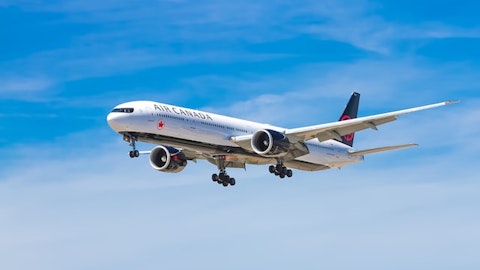In addition to that financing I’m pleased to report that we are in active discussions to secure the remaining $50 million of the $500 million financial investment. Delta and our new investors have a vested interest in the long-term success of the company and will own approximately 95% of the total equity of the company after the final issuance of shares following today’s shareholder meeting. This is a testament to the fact that Delta and our new investors view us as an important strategic investment. The confidence of these investors following a comprehensive due diligence process in our strategy and go-forward plan was a contributing factor to why I joined the company. Our new Board and our entire Wheels Up team are highly engaged in the business and focused on the long-term success of the company.
I’m very excited to lean into the range of expertise in travel tourism and capital markets from our newest investors, and the deep experience and commitment of our world-class team. So let me turn to my priorities over the next 12 months. Our goal is to provide customers the flexibility and accessibility they need to optimize each and every trip business or leisure domestic or international operated on our owned operated fleet or fulfilled with third-party aircraft. Historically, the vast majority of Wheels’ are flying is for leisure customers. That means much of our flying is primarily on weekends and holidays leaving us with underutilized capacity on many weekdays. We expect our collaboration with Delta on new commercial engagements will lead to increased corporate customers that typically engage in more midweek flying.
A higher mix of corporate flying will further leverage our network density and increase our asset utilization and efficiency driving down our unit costs. Within the next year, we expect nearly all of our controlled fleet flying will be on the new regional program, which will let us harness the density advantages inherent in our in-region network for our own leased aircraft and allow us to reduce the size of our controlled fleet. As I’ve already indicated, we expect to continuously improve our operating performance. We believe our performance today matches up well with the rest of the industry, though it is hard to compare since the private aviation industry does not publish performance statistics like their commercial counterparts. Our goal is to lead the industry in operating performance and to add customers as we grow with the confidence that we can provide an exceptional and differentiated service.
All of these actions support our plan to achieve positive adjusted EBITDA in 2024 and position the company well for a sustainable future. As Todd will more fully describe, we have already made steady quarter-over-quarter improvements toward this goal. Before I turn the call over to Todd to do a financial review, I want to take a minute to thank him for his leadership and guidance over these past six months. The company is in a much stronger position today because of his efforts and critical contributions in getting the company through a difficult period that has led to this new and exciting chapter. So with that, I will let Todd provide a financial review.
Todd Smith: Thanks, George. It’s been my pleasure. It is great to be with you all today. For the operating and financial update, I will focus on three topics. The highlights from our third quarter performance, details on our operating priorities and progress and how we are on track to deliver on our commitment to achieve positive adjusted EBITDA in 2024. Starting with the highlights of the third quarter. Revenue was $320 million for the quarter down year-over-year, but consistent with our financial plan and a shift to a more profitable regional model. Membership revenue was down slightly year-over-year, largely reflective of the reduction in our program offering and despite continued strong retention of our existing customers.
Flight revenue was down 9% sequentially and 23% year-over-year, reflecting a slowdown in industry volumes as well as company-specific market-related concerns of our financial position prior to the capital infusion from Delta and our new investors. As a reminder, going forward, our reported revenue will be lower due to the divestiture of our aircraft management business, which represented $53 million of revenue in the third quarter. Our adjusted contribution margin was 11% in the quarter, including $5.9 million of onetime software license revenue. Excluding that, our underlying adjusted contribution margin was 9.2%, up sequentially and at the highest level in over two years. We have reduced fixed costs through the opening of our member operations center and fleet consolidation, while charter margins have also improved.




